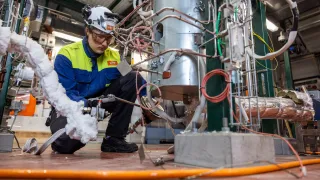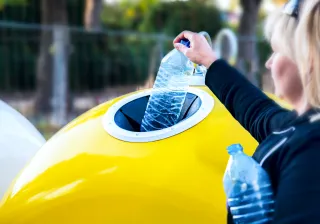Mechanical recycling alone cannot meet the plastics recycling targets set in the EU and national legislation. Chemical recycling offers another important route to recycle plastics. Instead of incineration of the challenging waste streams, it allows producing virgin-like plastics for high-value-added products. A recently completed UrbanMill project led by VTT Technical Research Centre of Finland in partnership with Aalto University addressed this topic providing important know-how for the next level R&D and scaling up.
Today in Finland the recycling rate of packaging plastics is somewhat below 40%. The new waste law sets the target of 55 % by 2030. Thus, there is an enormous need to increase the share of the plastic waste that can be industrially recycled back to new high quality plastic materials. In the UrbanMill project, key players in Finnish industry and research joined forces to tackle this challenge by developing an industrial chemical recycling concept for plastic waste. Funded by Business Finland, VTT, Aalto University and participating companies, the two-year UrbanMill project with a budget of EUR 3 million ended in October 2024. The project was closely linked to Borealis SPIRIT and Valmet Beyond Circularity ecosystems led by these “Veturi” companies.
UrbanMill project partners covered the value chain of chemical recycling of plastics in Finland
The UrbanMill project aimed to develop a next-generation pyrolysis-based chemical recycling to produce equivalent-to-new quality recycled plastics from mixed plastic waste and to increase plastic recycling rates. The work plan consisted of extensive experimental research from laboratory to pilot scale that was supported by techno-economic and environmental impact assessments for the process concept. “When we were setting up the SPIRIT research plan back in 2021, the chemical recycling of plastic waste was one of the first topics we included. UrbanMill has been the SPIRIT cornerstone project in the plastic waste pyrolysis.” reflects Jaakko Tuomainen, the manager of the SPIRIT programme.
“The results showed that polyolefin-rich mixed plastic waste containing polystyrene, polyamide and PET can be recycled using fast pyrolysis. Sink-float can be a cost-effective pre-sorting for pyrolysis, and unwanted components in pyrolysis oil can be adequately removed. Valuable side products, such as caprolactam or benzoic acid can be recovered for a better overall yield. Chlorine content can also be removed to below a few ppm level by a smart combination of sink-float, catalytic pyrolysis, adsorption and hydrotreatment,” says Anja Oasmaa, Senior Principal Scientist at VTT. She acted as the project manager for UrbanMill.

Promising learnings
As the main results of the UrbanMill project, knowledge and R&I capabilities on pyrolysis-based recycling were notably increased. The first trials for the scale up of pyrolysis from lab to large pilot scale were made with pure LDPE and real post-industrial multilayer film waste. The routes to chemically recycled, highly mixed and contaminated post-consumer and post-industrial plastic waste were also identified. Proof-of-concepts on PA6 decomposition to caprolactam and on various impurity removal technologies were done. The process concept assessment shows economic viability and indicates the critical steps needed to improve the overall yield and CO2 footprint. Furthermore, development of specific analytical methods needed were made during the project, which will pave the way for future research initiatives.
According to Mika Härkönen, Professor of Practice at VTT, the end-to-end value chain covering actors from waste management to manufacturers of end products has been extremely valuable in the project. Anja Oasmaa was truly impressed by the active participation and interest of the companies in the project. Companies contributed to the planning phase with not only by sharing valuable insights but also by providing raw materials and waste streams for piloting purposes.
For example, Wipak played an important role in driving the research on the challenging recycling of multi-layer packaging with polyamide used as barrier layer. ”UrbanMill project proved us that even challenging multilayer plastic materials can be recycled with chemical recycling. The new results from the project are truly remarkable and show us there will be a circular and recycled route for the raw materials used in food contact plastic packaging in the near future,” says Juho Johansson from Wipak.
Antti Raiko, Project manager of plastic chemical recycling in Valmet Beyond Circularity program says:
“UrbanMill project has increased our knowledge and competencies in plastic chemical recycling and thus accelerated our own Pyrolyzer development. I’m keen to see the fluidized bed pyrolysis technology commercialize in the near future.”
Jaakko Tuomainen shares the positive feeling: “We are learning more and more about pyrolysis – both about the challenges, but also about capabilities. For me, it is the most promising solution to get the plastic waste to material recovery, if mechanical recycling is not possible. The UrbanMill co-innovation ecosystem has built a foundation for pyrolysis-based chemical recycling, and I am very happy to see so many of the UrbanMill consortium members want to continue the pyrolysis development in the next co-innovation project.”
The UrbanMill work is planned to continue in the UrbanFactory project with the main target to notably increase the yields of the pyrolysis products and further increase the TRL level of the concept based on fluidized-bed pyrolysis technology. This will boost plastics waste recycling, reduce incineration, and make significant contributions to reduce CO2 emissions throughout the plastics industry value chain.
Project partners: VTT, Aalto University, Borealis, Valmet, Corex, Lamor, Reciclo, Keskinen Recycling, PR Pulping, Salpakierto, Stora Enso, Sulapac, SUMI, Wipak


